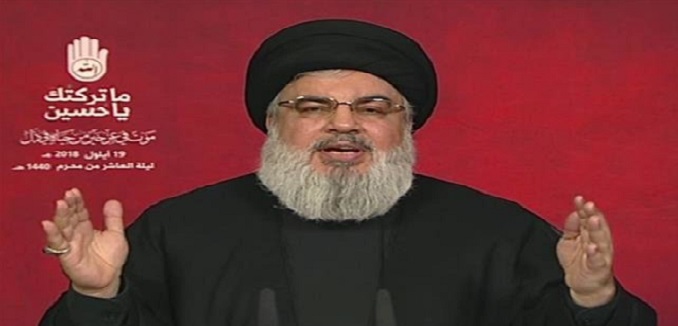Hezbollah’s leader told Shiite supporters in Beirut that despite Israeli efforts, the Iranian-backed terror group has acquired “highly accurate” rockets, the Associated Press reported Thursday.
In a speech to commemorate the important Shiite holiday of Ashoura, Sheikh Hassan Nasrallah said that Hezbollah “now possesses precision missiles and non-precision and weapons capabilities.”
The boast comes in the wake of an Israeli attack in the Syrian province of Latakia. The IDF explained that the military airstrikes in Latakia were against a facility that was used “to manufacture accurate and lethal weapons.” The weapons were being transferred to Hezbollah and “posed an intolerable threat” to Israel, the IDF added.
Israel took the unusual step of taking credit for the airstrikes on Latakia, after Syrian anti-aircraft fire downed a Russian reconnaissance plane, killing all crew members aboard. Initially, Russia blamed Israel, but later Russian President Vladimir Putin said that Israel was not responsible for shooting down the plane, but that the plane was hit as a result of a “chain of tragic accidental circumstances.”
In a subsequent phone call with Israeli Prime Minister Benjamin Netanyahu, Putin, however, warned that Israel should not “allow such situations in the future.” Israel’s air force chief is headed to Moscow on Thursday to offer Israel’s explanation of the events to the Russian government.
In a press briefing hosted by The Israel Project on Thursday, Israel’s former National Security Advisor Yaakov Amidror explained why Israel needed to act and why Syria was at fault for downing the plane.
The strike on Latakia was necessitated because it was a facility that was “used by the Iranians to enhance the abilities of long-range Hezbollah missiles,” Amidror said. He added that Israel is “very clear” about its red lines in Syria, saying that “we will not allow the Iranians and the Syrians to make Hezbollah stronger by providing ‘game-changer’ weapons systems.” In addition, Israel will not allow Iran to build “independent war machines in Syria.” Amidror said that these two factors have been behind the more than 200 attacks Israel has carried out in Syria since 2012.
Amidror characterized the downing of the Russian plane by Syrian anti-aircraft fire as a “huge mistake” by the Syrians. He later explained that nothing about the Russian plane had anything in common with the Israeli planes on Syrian radar. The location of the Russian aircraft was not where the Israeli planes had been, and the Russian plane was both larger and slower than the Israeli planes that carried out the attack.
The timing was also wrong as the shootdown of the Russian plane “is not when we made the strike.” In fact, Amidror pointed out that when it happened, “our airplanes were above Israel.”
Amidror called the loss of life “tragic,” but attributed it to the “very poor professional behavior” of the Syrian army, which Israel could not take into account when planning the attack.
Addressing the possible repercussions of the incident, Amidror expressed his hope that Israel’s professionals would convince their Russian counterparts that Israel did all it could to avoid damage to Russian personnel and assets.
Addressing the possible repercussions of the incident, Amidror expressed his hope that Israel’s professionals would convince their Russian counterparts that Israel did all it could to avoid damage to Russian personnel and assets. Ultimately, it will be Putin’s decision how to react, Amidror said, but that the better Israel’s representatives explained its case, the better chance his reaction to the incident would be muted. He also said that Israel and Russia should update its current de-confliction agreement over Syria to avoid future tragedies, but that it’s hard to account for stupidity.
Still, Amidror emphasized that even if Russia restricted Israel’s freedom of operation in Syria, Israel still considers the transfer of “game-changer” weapons to Hezbollah, or the ability of Iran to manufacture weapons in Syria, to be red lines that Israel would have to deal with.
A complete recording of the briefing is embedded below.
[Photo: PressTV ]




